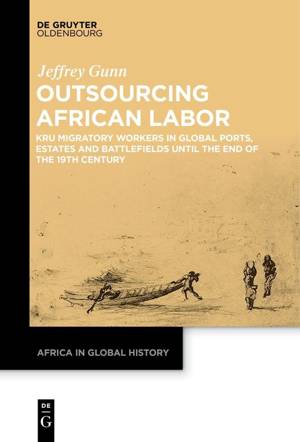
- Retrait gratuit dans votre magasin Club
- 7.000.000 titres dans notre catalogue
- Payer en toute sécurité
- Toujours un magasin près de chez vous
- Retrait gratuit dans votre magasin Club
- 7.000.000 titres dans notre catalogue
- Payer en toute sécurité
- Toujours un magasin près de chez vous
Outsourcing African Labor
Kru Migratory Workers in Global Ports, Estates and Battlefields Until the End of the 19th Century
Jeffrey GunnDescription
By the late eighteenth century, the ever-increasing British need for local labour in West Africa based on malarial, climatic, and manpower concerns led to a willingness of the British and Kru (West African labourers from Liberia) to experiment with free wage labour contracts. The Kru's familiarity with European trade on the Kru Coast (modern Liberia) from at least the sixteenth century played a fundamental role in their decision to expand their wage earning opportunities under contract with the British. The establishment of Freetown in 1792 enabled the Kru to engage in systematized work for British merchants, ship captains, and naval officers. Kru workers increased their migration to Freetown establishing what appears to be their first permanent labouring community beyond their homeland on the Kru Coast. Their community in Freetown known as Krutown provided a readily available labour pool and ensured their regular employment on board British commercial ships and Royal Navy vessels circumnavigating the Atlantic and beyond. In the process, the Kru established a network of Krutowns and community settlements in many Atlantic ports including Cape Coast, Fernando Po, Ascension Island, Cape of Good Hope, and in the British Caribbean in Demerara and Port of Spain.
Outsourcing African Labour in the Nineteenth Century: Kru Migratory Workers in Global Ports, Estates and Battlefields structures the fragmented history of Kru workers into a coherent global framework. The migration of Kru workers in the Atlantic, Indian and Pacific Oceans, in commercial and military contexts represents a movement of free wage labour that transformed the Kru Coast into a homeland that nurtured diasporas and staffed a vast network of workplaces. As the Kru formed permanent and transient working communities around the Atlantic and in the British Caribbean, they underwent several phases of social, political, and economic innovation, which ultimately overcame a decline in employment in their homeland on the Kru Coast by the end of the nineteenth century by increasing employment in their diaspora.
There were unique features of the Kru migrant labour force that characterized all phases of its expansion. The migration was virtually entirely male, and at a time when slavery was widespread and the slave trade was subjected to the abolition campaign of the British Navy, Kru workers were free with an expertise in manning seaborne craft and porterage. Kru carried letters from previous captains as testimonies of their reliability and work ethic or they worked under the supervision of experienced workers who effectively served as references for employment. They worked for contractual periods of between six months and five years for which they were paid wages. The Kru thereby stand out as an anomaly in the history of Atlantic trade when compared with the much larger diasporas of enslaved Africans.
Spécifications
Parties prenantes
- Auteur(s) :
- Editeur:
Contenu
- Nombre de pages :
- 275
- Langue:
- Anglais
- Collection :
- Tome:
- n° 4
Caractéristiques
- EAN:
- 9783110680225
- Date de parution :
- 19-07-21
- Format:
- Livre relié
- Format numérique:
- Genaaid
- Dimensions :
- 156 mm x 234 mm
- Poids :
- 566 g







